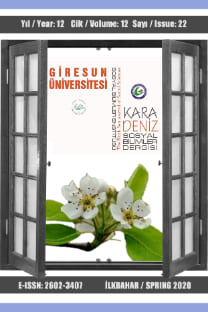“Siyasal Alan” Sorunsalı Bağlamında Kültür-Politik Şiddet
The Culture-Politics Violence In the Context of the Problematic of “Political Sphere”
___
- Althusser, L. (1995). Kapital'i Okumak. Çev. Celal A. Kanat. İstanbul: Belge Yayınları.
- Althusser, L. (2003). İdeoloji ve Devletin İdeolojik Aygıtları. Çev. Alp Tümertekin. İstanbul: İthaki Yayınları.
- Anderson, P. (1974). Lineages of the Absolutist State. Londra: NLB Arendt, H. (2006). Şiddet Üzerine. Çev. Bülent Peker. İstanbul: İletişim Yayıncılık.
- Bayat, A. (2007). Making Islam Democratic: Social Movement and the Post-Islamist Turn. Stanford: Stanford University Press.
- Camoy, M. (2015). Devlet ve Siyaset Teorisi. Çev. Simten Coşar, Aykut Örküp, Mete Pamir ve Mehmet Yetiş. Ankara: Dipnot Yayınları.
- Cemal, M. (1997). Birikim Dergisi. Hegelci Marx mı,Spinozac1 Althusser mi? S: 97. s. 1—7. (http://www.birikimdergisi.com Erişim tarihi: 21.06. 2016).
- Engels, F. (2002). Ailenin, Özel Mülkiyetin ve Devletin Kökeni. Çev. Kenan Somer. Ankara: Sol Yayınları.
- Ergül, E. (2016), Gazi Üniversitesi Hukuk Fakültesi Dergisi. Jean Bodin’in Devlet Teorisi Üzerindeki Osmanlı Etkisi C: XX. S: 1. s. 303—46.
- Friedrich, C. J. (1999). Sınırlı Devlet, Çev. Mehmet Turhan, Ankara: Gündoğan Yayıncılık.
- Friedrich, C., J. ve Brzezinski, Z. (1965). Totalitarian Dictatorship and Autocracy.
- Pioneering Etlînt that Attempts to Classify and Describe otalitanan States. New York: Praeger.
- Gerges, F. A. (ed.). (2014), The New Middle East, Protest and Revolution in the Arab World. New York: Cambridge University Press.
- Gramsci, A. (1978). Selections from the Prison Notebooks, Çev. Quintin Hoare ve Geoffrey Nowell Smith (ed.). Londra: Lawrence and Wishart.
- Hacker, F. J. (1977). Crusaders, Criminals, Crazies: Terror and Terrorism in Our Time. New York: Cambridge Press.
- Hazır, H. (2001). Siyasal Şiddet ve Terörizm. Ankara: Nobel Yayınları.
- Jenkins, B. (Ed.). (1985). Terrorism and Personal Protection. Newton, MA: Butterworth.
- Kapani, M. (2014). Politika Bilimine Giriş. 36. Baskı, Ankara: Seçkin Yayınları (Bilgi Yayınevi).
- Karagöz, B. (2010). Şiddetin Görünümleri—Toplumsal ve Siyasal Şiddet, Likidite Şiddeti. İstanbul: Divan Kitap.
- Karagöz, B. (2013). Siyaset Sosyolojisi. Devlet. İstanbul: Lisans Yayıncılık, 57—100.
- Lenin, V. 1. (1994). Devlet ve İhtilâl. Çev. Kenan Somer. Ankara: Bilim ve Sosyalizm Yayınları.
- Magstadt, T. M. (2009).Understanding Politics Ideas, Institutions, and Issues. Belmont, CA: Cengage Learning.
- Marx, K. (2012). Louis Bonapart'ın 18 Brumaire'i. Çev. Sevim Belli. Ankara: Sol Yayınları.
- Robert, A. P. (2005). Dying to Win: The Strategic Logic of Suicide Terrorism. New York: Random House Trade Paperbacks.
- San, C. (1996). Köktencilik ve Çoğulculuk, Alman Kültür Merkezi ve AÜ Siyasal Bilgiler Fakültesi GETA Merkezi Isbirligi ile Düzenlenen Sempozyum Bildirileri. Giriş Konuşması. 9-10 Aralık 1994. Çev. Nezih Pala, Coşkun San (ed.), Ankara: Bizim Büro, s. 12—4.
- Sancar, M. (2000-01). Doğu—Batı Düşünce Dergisi. Şiddet, Şiddet Tekeli ve Demokratik HukukDeVleti. 8.13. s.25—44.
- Sancar, M. (2004). “Devlet Aklı” Kıskacında Hukuk Devleti. İstanbul: İletişim Yayınları.
- Saybaşılı, K. (1985). Siyaset Biliminde Temel Yaklaşımlar. Ankara: Birey ve Toplum Yayınları.
- Söylemez, A. (2014). Güncel Hukuk Dergisi. Yargı Siyasal/aştı mi?. C.4. 8.124. s. 28-9.
- Turhan, M. (1997). Anayasal Devlet. Ankara: Gündoğan Yayınları.
- Weber, M. (2006). Meslek Olarak Siyaset. Çev. Afşar Timuçin ve Mehmet Sert. İstanbul: Chiviyazıları Yayınevi.
- Zabunoğlu, Y. K. (1963). Bir Hukuk ve Siyasal Bilim Problemi Olarak Devlet Kudretinin Sinirlaiıdirilması. Yayınlanmamış Doktora Tezi. Ankara Üniversitesi Hukuk Fakültesi.
- ISSN: 2602-3407
- Yayın Aralığı: Yılda 2 Sayı
- Başlangıç: 2009
- Yayıncı: -
Ayten Kaya Görgün’ün “Arıza Babaların Çatlak Kızları” Adlı Romanına Dair Bazı Tespitler
İlköğretim Öğrencilerinin Okuma Profilinin “Okuma Eğilimleri” Bağlamında İncelenmesi*
Gıyasettin AYTAŞ, Müzeyyen ALTUNBAY
“Siyasal Alan” Sorunsalı Bağlamında Kültür-Politik Şiddet*
İlköğret m Öğrenc ler n n Okuma Prof l n n “Okuma Eğ l mler ” Bağlamında İncelenmesi
Gıyasettn AYTAŞ, MÜZEYYEN ALTUNBAY
Karlıova’da (Bingöl) Sürdürülen Yarı-Göçebelik
Ulus-ötesi Yurttaşlık Kimliğine Sahip Ahıskalı Türkler
Üniversite Öğrencilerinin Algılanan Stres Düzeylerinin Çeşitli Değişkenler Açısından İncelenmesi
LEVENT BAYRAM, DENİZ ÖZGE YÜCELOĞLU KESKİN, DENİZ GÜNAY DEREBAŞI
Güç Yönet m ve Türk Kamu Yönet m nde Güç Yönet m Uygulamalarının Yeri
Erol IŞIKÇI, YASEMİN MAMUR IŞIKÇI
Güç Yönetimi ve Türk Kamu Yönetiminde Güç Yönetimi Uygulamalarının Yeri
